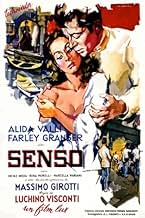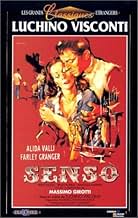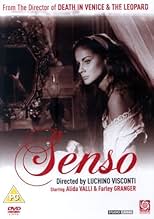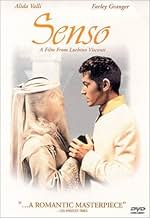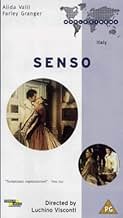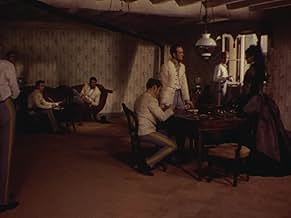Senso
- 1954
- Tous publics
- 2h 3min
NOTE IMDb
7,4/10
9,6 k
MA NOTE
Une comtesse italienne perturbée et névrosée trahit le pays tout entier pour une histoire d'amour autodestructrice avec un lieutenant autrichien.Une comtesse italienne perturbée et névrosée trahit le pays tout entier pour une histoire d'amour autodestructrice avec un lieutenant autrichien.Une comtesse italienne perturbée et névrosée trahit le pays tout entier pour une histoire d'amour autodestructrice avec un lieutenant autrichien.
- Réalisation
- Scénario
- Casting principal
- Récompenses
- 3 victoires et 2 nominations au total
Franco Arcalli
- Un soldato
- (non crédité)
Aldo Bajocchi
- Un soldato
- (non crédité)
Ottone Candiani
- Un soldato
- (non crédité)
Nando Cicero
- Un soldato
- (non crédité)
Claudio Coppetti
- Un soldato
- (non crédité)
Cristoforo De Hartungen
- Il generale Hauptmann
- (non crédité)
Tony Di Mitri
- Un soldato
- (non crédité)
Avis à la une
Italian historical melodrama, from Lux Film and director Luchino Visconti is set in Venice in 1866. The Austrian army has occupied the city-state, and will not allow it to unite with Italy. A small but increasingly vocal faction of Venetian revolutionaries are working toward rebellion, aided by the Prussians. It is with this background the main story unfolds, as Venetian countess Livia (Alida Valli), unhappily married to the much older Count (Heinz Moog), begins an affair with arrogant young Austrian officer Franz Mahler (Farley Granger). Mahler is using Livia as a diversion and for her money, but she becomes more and more obsessed with him, even as full-blown war erupts around them.
This torrid romantic melodrama is best appreciated for Visconti's painterly compositions, the excellent location cinematography, and the detailed costumes and set design. The story itself is merely adequate, and the performances are uneven. Valli has some great moments, but in others she's asked to play it too wild-eyed and big. Granger is sneering and self-satisfied, but he loses it a bit in his big breakdown scene near the end. Visconti edited an English-language version which was re-titled The Wanton Countess and ran 30 minutes shorter. That version's English dialogue was written by Tennessee Williams and Paul Bowles. Among Visconti's assistants on this film were future directors Francesco Rosi and Franco Zeffirelli. This is one of the 1001 Movies You Must See Before You Die.
This torrid romantic melodrama is best appreciated for Visconti's painterly compositions, the excellent location cinematography, and the detailed costumes and set design. The story itself is merely adequate, and the performances are uneven. Valli has some great moments, but in others she's asked to play it too wild-eyed and big. Granger is sneering and self-satisfied, but he loses it a bit in his big breakdown scene near the end. Visconti edited an English-language version which was re-titled The Wanton Countess and ran 30 minutes shorter. That version's English dialogue was written by Tennessee Williams and Paul Bowles. Among Visconti's assistants on this film were future directors Francesco Rosi and Franco Zeffirelli. This is one of the 1001 Movies You Must See Before You Die.
Opens with a lush rendition of Il Trovatore at Teatro La Fenice, SENSO is an ostentatious melodrama imprinted with Visconti's pronounced blue blood opulence, retells an Italian countess' (Valli) vain and poignant attempt to pursue her one-sided affection to an Austrian officer (Granger shines in the rich Technicolor palette as an Adonis), whose misogyny and promiscuity will cause his own doom and mar her mentality up to the hilt.
The film sets its time during the fall of Austrian occupation in Venezia 1866, Valli is wavering between her bureaucratic husband (Moog) and rioting cousin (Girotti), to break loose from the stalemate, she irrevocably falls for a young lieutenant in the opponent camp, but he is no knight in shining armor but a foul and spineless scoundrel with irresistible sheen of deadly charm. Granger's gorgeous lover-boy image is a quintessential smokescreen to veil his despicable innards, but after all, it is a consensual deal despite of Valli's false hope, more significantly its anti-war signals have been forcibly cast by Granger's self-abandonment and the lousy war battlefield experienced by Girotti, which, more plausibly it is an intentional move by Visconti, a distraction from the central turmoil, but done with a tinge of amateurish fecklessness.
Valle shoulders on a profound effort to scrutinize a woman's inscrutable sexual desire which being repressed for too long, both she and Granger align themselves with Visconti's brimful-of- emotion style (again, thanks to Techincolor and the overstuffed score as well) which approximate the OTT threshold in certain degree, although falling out with Visconti eventually, Granger succeeds in bringing about his best screen persona and it was such a great era when a gay man can play an outright straight womanizer on the celluloid.
On the one hand SENSO fails to impress me as my favorite among Visconti's work of art, and scale-wise pales by comparison with LUDWIG (1972, 8/10) and THE LEOPARD (1963, 8/10), but on the other hand, only Visconti can flaunt such an overbearing melodrama with true mettle and without any compromise, a trend-setter would inspire later kindred spirits, for instance Baz Luhrmann's 3D adaption of the bourgeois sumptuosity THE GREAT GATSBY (2013, 8/10).
The film sets its time during the fall of Austrian occupation in Venezia 1866, Valli is wavering between her bureaucratic husband (Moog) and rioting cousin (Girotti), to break loose from the stalemate, she irrevocably falls for a young lieutenant in the opponent camp, but he is no knight in shining armor but a foul and spineless scoundrel with irresistible sheen of deadly charm. Granger's gorgeous lover-boy image is a quintessential smokescreen to veil his despicable innards, but after all, it is a consensual deal despite of Valli's false hope, more significantly its anti-war signals have been forcibly cast by Granger's self-abandonment and the lousy war battlefield experienced by Girotti, which, more plausibly it is an intentional move by Visconti, a distraction from the central turmoil, but done with a tinge of amateurish fecklessness.
Valle shoulders on a profound effort to scrutinize a woman's inscrutable sexual desire which being repressed for too long, both she and Granger align themselves with Visconti's brimful-of- emotion style (again, thanks to Techincolor and the overstuffed score as well) which approximate the OTT threshold in certain degree, although falling out with Visconti eventually, Granger succeeds in bringing about his best screen persona and it was such a great era when a gay man can play an outright straight womanizer on the celluloid.
On the one hand SENSO fails to impress me as my favorite among Visconti's work of art, and scale-wise pales by comparison with LUDWIG (1972, 8/10) and THE LEOPARD (1963, 8/10), but on the other hand, only Visconti can flaunt such an overbearing melodrama with true mettle and without any compromise, a trend-setter would inspire later kindred spirits, for instance Baz Luhrmann's 3D adaption of the bourgeois sumptuosity THE GREAT GATSBY (2013, 8/10).
It's no coincidence that the film opens at the opera. In some fine deep shots we are introduced to our characters with the performance in the background - no doubt to establish the stylistic connection. So Visconti, and collaborator Franco Zefferelli, wanted to make an opera without the singing. This gives us grandeur, but rigidity, and even the mini riot that takes place in the opera house at the outset is aesthetically stylised. You need to buy into the approach at this point, and I simply didn't. It just seemed like a bad idea. Opera is a stage spectacle, all about grand gesture, posturing, formality; it cannot transmit subtleties, the format doesn't allow it. Take away the music and you are left with a banal story and a lot of fancy costumery. For Visconti, constantly wanting to remind us of his noble descent, that is enough - his main concern is showing us lavish interior decor, an obsession you'll find either stirring or stifling. For music we get Bruckner, whose indecisive, meandering drone is largely ignorable.
Cinematically, the result is half-baked. Valli walks into a room full of Austrian soldiers. David Lean (who I equate with Visconti to some extent) would have made a significant scene out of this but Visconti just gives us soldiers draped around the place in various unnatural postures, as you might expect. One of them moves and strikes up a different posture as you might expect. It's all cut and pasted from the Manual of Things Seen and Done Before. The camera stays back, wide angle, and doesn't lend much of a hand with the narrative, leaving the players to communicate with exaggerated gesture.
A married Venetian countess falls for a young Austrian army officer - we know from the first scene that he is an utter cad, but she doesn't or rather she does, but being a one dimensional clinging woman she is bound to hurl herself into disastrous folly. Hence the film mainly consists of Valli ringing the emotional changes over her illicit affair. Visconti indulged so much time in this that he must have thought he was dealing with an original topic. Along the way, there's the approaching end of Austrian rule of northern Italy and some slight comment on the collaboration of senior Venetian figures but that point seems hardly worth making after all this time. There is a lengthy section where Valli's cousin (dashing hero figure) rushes on a military errand rather ridiculously right across the battle line of two approaching armies, but this section was apparently heavily edited, rendering it pointless and incomprehensible. The battle scenes are childish a puff of smoke and the nearest two soldiers fall to the ground this happens repeatedly.
The script can't do anything with the stereotypical characters and the one-sentence plot and there are no stand-out lines. This is extraordinary considering the 'English dialogue by Tennessee Williams and Paul Bowles'. Probably it was there but smothered by Visconti's operatic technique. One wonders why these writers were attracted to the project (apart from a free holiday in Rome) perhaps they liked the final humiliation of the countess, which is quite harsh even gleefully misogynistic. She gets her own back though, and it seems the moral is that both men and woman, with their impulsive need for each other, no matter how noble the exterior, are stupid, weak and mutually self-destructive. That ridicules everybody (...or does it?).
Funnily enough, the main problem is Alida Valli, who is required to over-emote in every scene (in total contrast to her depressive role in "The Third Man") it's a little unpleasant to watch and she soon begins to annoy. She doesn't look right at all during the romance too hard-edged. Farley Granger was actually the main point of interest. His slight woodenness suits the impossibly white uniform and cape he was made to wear (what sort of wash-powder did they have in those days?), and in the climactic drunken scene (enhanced by a delightful whore - the highlight of the film) he did as well as anyone could have done under a direction that demanded over-amplification of every attempted nuance. And his eyes expressed something beyond the paltry plot of the film as if betraying that this Italian job was an odd, intense experience for him for one reason or another. So, for all the film's grandeur, all I was left with was some vague speculation of a personal nature about one of its players. Perhaps his story relating to the real world - is the film Visconti should have made.
Cinematically, the result is half-baked. Valli walks into a room full of Austrian soldiers. David Lean (who I equate with Visconti to some extent) would have made a significant scene out of this but Visconti just gives us soldiers draped around the place in various unnatural postures, as you might expect. One of them moves and strikes up a different posture as you might expect. It's all cut and pasted from the Manual of Things Seen and Done Before. The camera stays back, wide angle, and doesn't lend much of a hand with the narrative, leaving the players to communicate with exaggerated gesture.
A married Venetian countess falls for a young Austrian army officer - we know from the first scene that he is an utter cad, but she doesn't or rather she does, but being a one dimensional clinging woman she is bound to hurl herself into disastrous folly. Hence the film mainly consists of Valli ringing the emotional changes over her illicit affair. Visconti indulged so much time in this that he must have thought he was dealing with an original topic. Along the way, there's the approaching end of Austrian rule of northern Italy and some slight comment on the collaboration of senior Venetian figures but that point seems hardly worth making after all this time. There is a lengthy section where Valli's cousin (dashing hero figure) rushes on a military errand rather ridiculously right across the battle line of two approaching armies, but this section was apparently heavily edited, rendering it pointless and incomprehensible. The battle scenes are childish a puff of smoke and the nearest two soldiers fall to the ground this happens repeatedly.
The script can't do anything with the stereotypical characters and the one-sentence plot and there are no stand-out lines. This is extraordinary considering the 'English dialogue by Tennessee Williams and Paul Bowles'. Probably it was there but smothered by Visconti's operatic technique. One wonders why these writers were attracted to the project (apart from a free holiday in Rome) perhaps they liked the final humiliation of the countess, which is quite harsh even gleefully misogynistic. She gets her own back though, and it seems the moral is that both men and woman, with their impulsive need for each other, no matter how noble the exterior, are stupid, weak and mutually self-destructive. That ridicules everybody (...or does it?).
Funnily enough, the main problem is Alida Valli, who is required to over-emote in every scene (in total contrast to her depressive role in "The Third Man") it's a little unpleasant to watch and she soon begins to annoy. She doesn't look right at all during the romance too hard-edged. Farley Granger was actually the main point of interest. His slight woodenness suits the impossibly white uniform and cape he was made to wear (what sort of wash-powder did they have in those days?), and in the climactic drunken scene (enhanced by a delightful whore - the highlight of the film) he did as well as anyone could have done under a direction that demanded over-amplification of every attempted nuance. And his eyes expressed something beyond the paltry plot of the film as if betraying that this Italian job was an odd, intense experience for him for one reason or another. So, for all the film's grandeur, all I was left with was some vague speculation of a personal nature about one of its players. Perhaps his story relating to the real world - is the film Visconti should have made.
A feast for the eyes this lush melodrama may be an acquired taste for some but I doubt anyone could say it wasn't visually stunning. Venice is rendered so beautifully you will want to hop the next flight there and with the composition of all the other scenes it is like watching a story take place inside of paintings. However as gorgeous as all that is it also can be distracting and take you out of the story as you study the detail which at times feels a bit surreal. Having only seen Alida Valli in her English language films where she often seemed stiff and ill at ease her performance here is quite a revelation. She is fully in command of the screen and her anguished turmoil is compelling to watch. Farley is not bad although his part really doesn't offer him much more than being a slick and very handsome wastrel.
This has to be one of my all time old favorite Romantic Motion Picture.
Visconti brings about Magic and beauty onscreen making every shot a glamour in experience!
There are so many great moments in Senso that it will take you ages before this Picture wears out in your memory.
Besides the fact that Visconti is one of the great Film-makers of all times it has to be said that this Director simply had a feel about shots to form a scene to imprint that exact emotion or feeling that was intended by him. He always knew to capture and captivate the viewer and bring about that special bond which nowadays we have lost with contemporary Motion Pictures!
For all out there whom enjoy the Art of Film-making, for all whom cherish good Film-making, go fetch "Senso"! It's an experience not to forget!
Senso is about the magic which comes about when a Picture finds it's way through the Projector unto the White screen! It's an experience rarely seen but so is this Art which is only understood by a handful of Film-makers!
Luchino Visconti, I thank you for this venture and understanding of the greatest Art form in this Universe!
Visconti brings about Magic and beauty onscreen making every shot a glamour in experience!
There are so many great moments in Senso that it will take you ages before this Picture wears out in your memory.
Besides the fact that Visconti is one of the great Film-makers of all times it has to be said that this Director simply had a feel about shots to form a scene to imprint that exact emotion or feeling that was intended by him. He always knew to capture and captivate the viewer and bring about that special bond which nowadays we have lost with contemporary Motion Pictures!
For all out there whom enjoy the Art of Film-making, for all whom cherish good Film-making, go fetch "Senso"! It's an experience not to forget!
Senso is about the magic which comes about when a Picture finds it's way through the Projector unto the White screen! It's an experience rarely seen but so is this Art which is only understood by a handful of Film-makers!
Luchino Visconti, I thank you for this venture and understanding of the greatest Art form in this Universe!
Le saviez-vous
- AnecdotesThe film opens in La Fenice, the Venice opera house. La Fenice was destroyed by arson in 1996, but reopened in 2003. Enlarged frames of this movie were used as a reference in reconstructing it.
- Citations
Il tenente Franz Mahler: It's too late! It's over! I'm not your romantic hero!
- Versions alternativesTwo versions of the film are available on video.
- One version is missing the scene where Livia tries to explain where all the money meant for the troops went.
- Another version is missing the climatic battle sequence between the Austrian and Italian troops.
- ConnexionsEdited into Histoire(s) du cinéma: La monnaie de l'absolu (1999)
- Bandes originalesSinfonia N. 7 in mi maggiore (7th Symphony)
Music by Anton Bruckner
Performed by Orchestra Sinfonica Nazionale della Rai
Conducted by Franco Ferrara
Meilleurs choix
Connectez-vous pour évaluer et suivre la liste de favoris afin de recevoir des recommandations personnalisées
- How long is Senso?Alimenté par Alexa
Détails
- Date de sortie
- Pays d’origine
- Langues
- Aussi connu sous le nom de
- The Wanton Contessa
- Lieux de tournage
- Teatro La Fenice, Venise, Vénétie, Italie(opening scenes)
- Société de production
- Voir plus de crédits d'entreprise sur IMDbPro
Box-office
- Budget
- 700 000 000 ₤IT (estimé)
- Montant brut aux États-Unis et au Canada
- 27 723 $US
- Week-end de sortie aux États-Unis et au Canada
- 3 984 $US
- 28 oct. 2018
- Montant brut mondial
- 27 723 $US
- Durée
- 2h 3min(123 min)
- Couleur
Contribuer à cette page
Suggérer une modification ou ajouter du contenu manquant

![Regarder Trailer originale italiano [OV]](https://m.media-amazon.com/images/M/MV5BYzc0Y2MyOGMtMzg0My00Mzc4LWIwYjItZjg1ZDhmMDZmOTlkXkEyXkFqcGdeQXRodW1ibmFpbC1pbml0aWFsaXplcg@@._V1_QL75_UX500_CR0)

